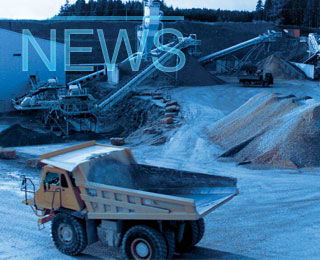HeidelbergCement Group made a significant announcement this week about the sale of several business activities in the US west region, under Lehigh Hanson's control, to US-based Martin Marietta Materials Inc. The transaction includes the sale of two cement plants, distribution terminals and activities in 17 aggregate sites and asphalt in the states of California, Arizona, Oregon and Nevada.
Dr Dominik von Achten, chairman of the Managing Board of HeidelbergCement, said: "The sale of our US West region activities is a major step in our portfolio optimisation as part of our 'Beyond 2020' strategy."
HeidelbergCement's Beyond 2020 strategy was launched at the group's Capital Markets Day in September 2020 and in part signals a change in direction in portfolio mananegment with a simplification of the country portfolio under the group and prioritisation of the strongest-growing markets. The strategy is the path that HeidelbergCement envisages to take up to 2025.
The west region sales include other downstream businesses under the Lehigh Hanson portfiolio in aggregates and asphalt, which will provide HeidelbergCement with a substantial sum to help reinvest in the restructuring of its building material businesses in global markets.
Which cement plants are up for sale?
The US west region sale amounts to US$2.3bn and looks to include the sale of two the company's Californian cement plants. The cement plant sales could relate to the 0.62Mta Redding cement plant and the larger 0.9Mta Tehachapi cement plant, although HeidelbergCement did not stipulate exactly which plants were being sold.
HeidelbergCement's statement advises that the Permanente (Cupertino) cement plant and quarry are not included in the transaction. The Permanente plant has been idle since the kiln overheated in 2019 and sustained damage from a refractory installation. The 80-year silos at the facility were repaired in 2020, according to local reports. The plant is close to the Bay Area but has to compete against aggressive imports.
The Redding factory was built in 1981 and is situated in an area where the wildfires have been so destructive in the last year. It is also the plant where HeidelbergCement announced as recently as March that it would be the site for the pilot of a new carbon capture project with Fortera's proprietary ReCarb™ technology to achieve a 60 per cent reduction in CO2 per tonne of product produced. The captured carbon is to be converted into a cementitious material that will be used in the production of a high-quality, low-carbon concrete.
The most modern of the group's plants in California, the Tehachapi plant, is located on the north side of the San Gabriel Mountains. Both the Tehachapi and Redding plants were among the four plants from Lehigh Hanson that won the EPA's Energy Star certification in 2018.
Martin Marietta's set for growth
Martin Marietta's President and CEO, Ward Nye, said: "With this acquisition, our company will be well-positioned to capitalise on long-term demand drivers from increased state infrastructure investment in California and Arizona as well as continued private-sector growth across these regions."
Martin Marietta currently operates three integrated cement plants and a cement terminal in Houston. The Midlothian and Hunter cement plants are both situated in Texas. The Riverside Crestmore white cement plant is located in California, but the grey cement grinding plant in Crestmore is closed. Martin Marietta has a total grey cement capacity of 4.6Mta.
Lehigh realigns its focus
The Californian cement market is still proving to be the most productive of the US states, topping the chart for clinker and cement production in February 2021, which is surely a pull factor for Martin Marietta. However, the environmental legislation in the state is amongst the toughest in the country and Lehigh Cement has had to invest US$12m in environmental control technology in California as part of a settlement with the US EPA for alleged violations of the Clean Air Act.
With these sales, Lehigh Hanson's strategy is becoming more defined. The proposed acquisition of the Giant Cement Keystone plant in Bath, Pennsylvania, and its decision to invest US$600m in the ongoing expansion project at its Mitchell plant in Indiana is realigning and strengthening some of the company's core markets. Following a delay, due to the COVID-19 outbreak, KHD Humboldt Wedag International resumed construction of the new line at the Mitchell plant earlier this year and it is on course to be operational in the 1Q23.
ICR covers the Florida cement market in the ICR May 2021 issue.
